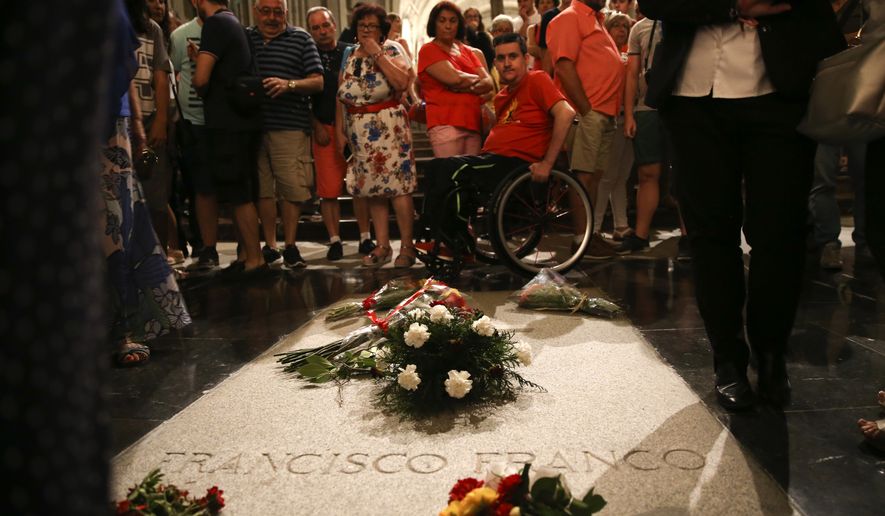MADRID — He’s still dead, but Francisco Franco’s ability to stir up controversy remains very much alive.
Spanish Prime Minister Pedro Sanchez has kicked off his term by whipping up a divisive political storm over plans to exhume the remains of the longtime right-wing dictator from their resting place at a war memorial.
“No democracy can pay tribute to a dictator,” Mr. Sanchez, a socialist, said at a press conference last week in Bolivia, where he was signing joint business ventures with leftist President Evo Morales.
Mr. Sanchez announced that he would establish a “truth commission” to investigate war crimes committed during the 1936-1939 civil war and that he wanted to turn Franco’s granite mausoleum into a civilian cemetery.
Franco’s gravesite “cannot be a place of reconciliation; it must be a place of rest,” Mr. Sanchez told reporters in Bolivia.
Speaking to journalists a day earlier, Justice Minister Dolores Delgado said legal obstacles could delay the opening of Franco’s crypt and that she could not set a date for the event. But Spain’s new government has drawn up amendments designed to ward off legal challenges to the exhumation and expects the national parliament to endorse the legislation as soon as this month.
The Valle de los Caidos (“Valley of the Fallen”) mausoleum, where Franco was buried 40 years ago, is built into a mountainside 30 miles northwest of Madrid. Also at the site are the remains of some 34,000 casualties of Spain’s brutal civil war.
Spanish conservatives compare the site to Arlington National Cemetery, but leftist leaders say they want it leveled.
Mr. Sanchez, who took office in June after conservative predecessor Mariano Rajoy lost a no-confidence vote in the wake of a corruption scandal, has introduced special legislation requiring the removal of Franco’s remains before the end of the year.
The Franco family, the Spanish military, the Catholic Church and both mainstream conservative parties object to the initiative. They warn that relocating Franco’s tomb could reopen old wounds.
“We reiterate our most firm and unanimous opposition to any exhumation of the remains of our grandfather,” Franco’s granddaughter Carmen Martinez Bordiu Franco said in a statement.
Followers of what was until recently considered the largely extinct right-wing Falangist movement, which supported Franco during his 40-year rule, held a vigil at his colonnaded gravesite. They raised their arms in fascist salute while singing their movement’s hymn, “Facing the Sun.”
Members of the armed forces have used social media to protest the “desecration” of Spain’s “most exemplary general,” and Catholic bishops have offered to find an alternative but equally dignified and publicly accessible resting place for Franco.
Boycotting a vote
Representatives for the main conservative opposition groupings, the People’s Party and Ciudadanos, announced their refusal to vote on the exhumation measures.
They accuse Mr. Sanchez of creating a smokescreen to deflect public attention from serious problems facing the country, including regional separatist movements, immigration pressures and a record deficit.
“The government has needed to go to the Valley of the Fallen to conceal its incapacity to govern,” said People’s Party leader Pablo Casado. Ciudadanos party head Albert Rivera has asked why Mr. Sanchez was giving priority to such a divisive and sensitive issue that is not a main concern for the vast majority of Spanish voters.
Mr. Sanchez received critical support in ousting Mr. Rajoy this spring from the hard-left United We Can party, as well as Catalan and Basque nationalists for whom Franco is also a hated symbol of the dominance of Madrid. Mr. Sanchez’s Socialist Workers Party holds just 84 of 350 congressional seats.
Madrid University law professor and political analyst Ramon Peralta said the politically inexperienced prime minister is using the issue of Franco’s grave to galvanize support from “communists and separatists” to maintain his “patchwork majority.”
The mausoleum’s history is one reason it remains a potent and divisive symbol four decades after the dictatorship was ousted and democratic rule restored.
“The Generalissimo” built Valley of the Fallen by using war prisoners as slave labor. Political persecutions and mass executions ordered by his regime in the civil war’s aftermath have been cataloged by the Association for the Recovery of Historical Memory, led by United We Can lawmakers.
They are demanding reparations for victims with support from the U.N. Commission on Human Rights. They have also called for bulldozing the Valley of the Fallen site and blowing up its giant cross.
But many Spaniards still view Franco as a patriarchal figure whose statesmanship kept Spain out of World War II, preserved its Catholic values and oversaw the transformation into a modern industrial state.
While Franco accepted Hitler’s military assistance, he denied Nazis the use of Spanish airfields to attack Britain’s strategic naval base in Gibraltar. Some historians consider that decision as a key contribution to the Allied victory.
Franco steered Spain into a postwar alliance with the United States and helped bring about unprecedented economic growth during the 1950s and 1960s. Supporters say the alliance facilitated a bloodless transition to democracy in the wake of Franco’s death.
When King Juan Carlos opened the first democratically elected congress in 1977, Spanish communist leader Santiago Carrillo took his seat as an elected representative despite accusations of war atrocities against Franco supporters.
The Sanchez government said Franco’s descendants will be formally asked what to do with the relocated remains and given 15 days to respond. If they decline to cooperate, then the government will choose a “dignified place,” Deputy Prime Minister Carmen Calvo said after the government’s weekly Cabinet meeting late last month.
A Spanish diplomat observed that the body of Napoleon Bonaparte — who ruled France as a dictator and started a series of wars that engulfed the continent — has been resting at a public mausoleum in the middle of Paris since the 19th century and nobody complains.




Please read our comment policy before commenting.